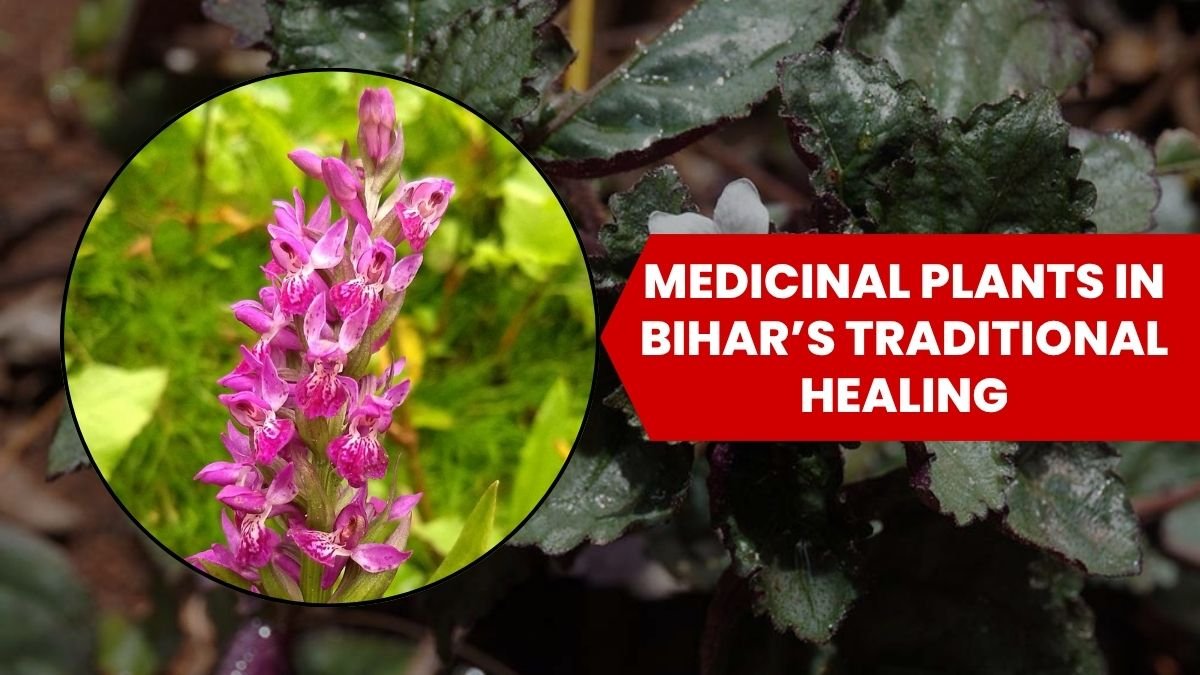Medicinal Plants in Bihar’s Traditional Healing: As we use modern medicine more often today, many people are becoming more interested in medicinal herbs and old medical practices. Besides being a cultural practice, traditional medicine has been important for health and healing for many years. Bihar’s fertile land, dense ecology and rich variety of plants have turned it into a major spot for traditional medicine.
Over many generations, Indian communities have relied on medical plants, especially “Tulsi”, “Neem”, “Amla”, “Giloy” and “Ashwagandha”. They have been used for healing in Indian homes and in official Ayurvedic medicine.
Role of Ayurveda
When it comes to India’s traditional medicine, Ayurveda stands out above the others. People believe Ayurveda began at least 2500 BC and is called the “science of life”. Ayurveda treats physical disease, but it mainly focuses on maintaining the harmony of a person’s body, mind and spirit.
In Bihar, many rural areas still rely on Ayurveda since it is difficult for them to use modern health clinics. Who are here are called vaidyas and for years they have been using herbs and simple remedies for treatment. It also plays a role in finding and fixing the source of the disease, so that health issues are avoided for longer.
Medicinal Plants and Their Uses
About 3000 types of medicinal plants have been identified in India so far, and Bihar is a significant contributor to this list. Some of the major medicinal plants here include:
- Tulsi (Ocimum sanctum): Extremely effective in cold, cough and fever. It has antibacterial and antiviral properties.
- Neem (Azadirachta indica): Useful for diseases like skin diseases, dengue, malaria. It is considered to purify the blood.
- Giloy (Tinospora cordifolia): Helpful in increasing immunity and treating fever.
- Ashwagandha (Withania somnifera): Effective in reducing stress and insomnia, as well as it increases physical strength.
- Amla (Emblica officinalis): Major source of vitamin C, which strengthens the immune system.
All these plants are not only a part of home remedies, but also form the basic foundation of Ayurvedic medicines.
Phytochemicals and their importance
The secret of the effectiveness of medicinal plants lies in the phytochemicals present within them. These are bioactive compounds that are naturally produced by plants and have medicinal properties. Such as:
- Alkaloids: Helpful in pain relief, high blood pressure and infection control.
- Flavonoids: Antioxidant and anti-inflammatory effects.
- Terpenoids: Anti-cancer and liver protective properties.
Research on these chemicals is still being done all over the world, and many modern medicines are based on these compounds. This proves that medicinal plants are not only a heritage of the past, but can also become the basis of future medicine.
Challenges and need for conservation
Although the importance of medicinal plants is increasing, the need for conservation and sustainable use is equally important. Many medicinal plant species are in danger due to deforestation, climate change and indiscriminate exploitation. There are still many plants in the rural areas of Bihar that are preserved only in oral traditions and lack scientific documentation.
The government and non-governmental organizations should promote the identification, conservation and cultivation of these plants. Also, train local communities and Vaidyas and give a systematic form to their traditional knowledge.
Conclusion
Bihar is an important medicinal storehouse due to its diverse bio-wealth and traditional medical knowledge. People here still keep themselves and their families healthy with plants like Tulsi, Neem, Giloy. This is not only a cheap and safe way to health, but it is also linked to our cultural identity.
Today, when the whole world is returning to natural and herbal treatments, then the traditional medical systems of states like Bihar and their plants can make their special identity on the global stage. For this, we have to emphasize on the protection, promotion and proper documentation of these invaluable resources.
If this effort is made, not only will the people of Bihar get health benefits but it will also strengthen the Ayurvedic industry and rural economy.
